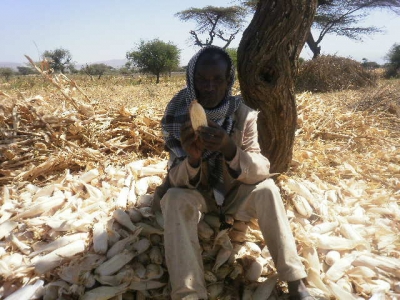Migration surged this summer as Ethiopians left for neighboring countries like Sudan, and farther, to Gulf and European nations in search of higher wages, better opportunities, and now, escaping shortages caused by a lack of rain.
The UN projects that 4.5 million Ethiopians will need aid, up from the 1.5 million estimated earlier this year, although the Ethiopian government has dismissed the need for international food aid.
Ethiopia also anticipates the impacts of El Niño, a meteorological phenomenon that occurs every two to seven years in varying intensity. It is caused by shifting of winds in the Pacific Ocean, which cause warm water to move east. The storm is projected to build in the fall and winter of 2015, and spill over into 2016, bringing heavy rains in the dry season, and not enough rain in the rainy season.
Combined with the already dry regions in eastern and southern Ethiopia, El Niño could create extreme drought in some regions, and flooding in others, causing crop failures and cases of malaria. Experts say that this El Niño event could rival the record 1997 storm, which caused international stress, scarcity, and disasters.
Migration has been driven by push and pull factors - Ethiopians are pulled by higher wages and opportunities in other countries, and pushed by drought, malnutrition, and scarcity.
Although Ethiopia’s economic growth is often cited as one of the region’s strongest - nearly nine percent each year for the past four years- much of the growth and economic benefits have been unequally distributed, and have been concentrated in the business class. Much of Ethiopia’s population is still limited to low wages - an average of $60 per month - and pre-industrialized agriculture jobs.
This concentration makes many Ethiopians vulnerable to fluctuations in climate, especially rainfall. The Associated Press reports that rain-based agriculture is the primary sector of the country’s economy - it produces almost 45 percent of the GDP and employs over 85 percent of its population. July’s seasonal rains did not come this year, which has caused the death of livestock such as cattle, and crop failures, raising fears that there will be a hike in food prices.
Food security and agricultural dependency are pushing many Ethiopians out of the country, even though the Ethiopian government says that they are prepared for this latest iteration of the region's cyclical famine.
Redwan Hussien, the minister of the Ethiopian Government Communications Affairs Office, said that the government was effectively managing resource shortages. "We are able to feed ourselves and hence the magnitude of the problem has not been felt by the majority of the public including in areas affected by the shortage of rain," he told The Reporter, an Ethiopian news outlet.
International observers and watch groups are concerned about the government's capacity to respond effectively to the looming crisis. The Famine Early Warning Systems Network reports that the region is seeing abnormal levels of livestock deaths and nonseasonal livestock migration, and projects that there will be an increase in acute malnutrition.
Dawit Ayele Haylemariam, a graduate student previously with the Ethiopian Ministry of Finance and Economic Development and Ethiopian Agricultural Transformation Agency, argues that the Ethiopian government’s authoritarian nature prevents it from effectively managing the famine and that there is no incentive for the government to manage the famine effectively. “Autocrats often don't care enough about the population to prevent famine. Autocrats maintain power through force, not popular approval,” he wrote in The Huffington Post. And historical precedent is not encouraging - the country has suffered several major famines since the early 1900s.
The UN anticipates an additional $230 million in needed food-aid funds by the end of 2015 due to El Nino.
-//-
The cover photo, by Flickr user CDKNetwork, can be found here.
BLOG COMMENTS POWERED BY DISQUS

